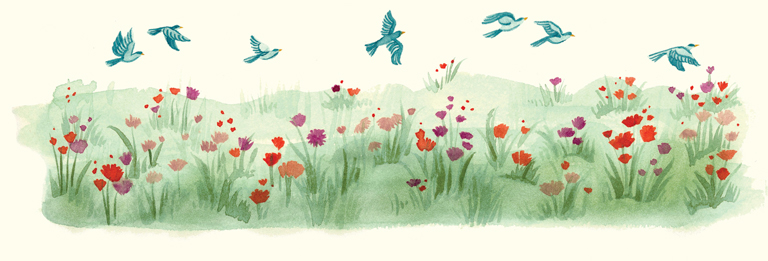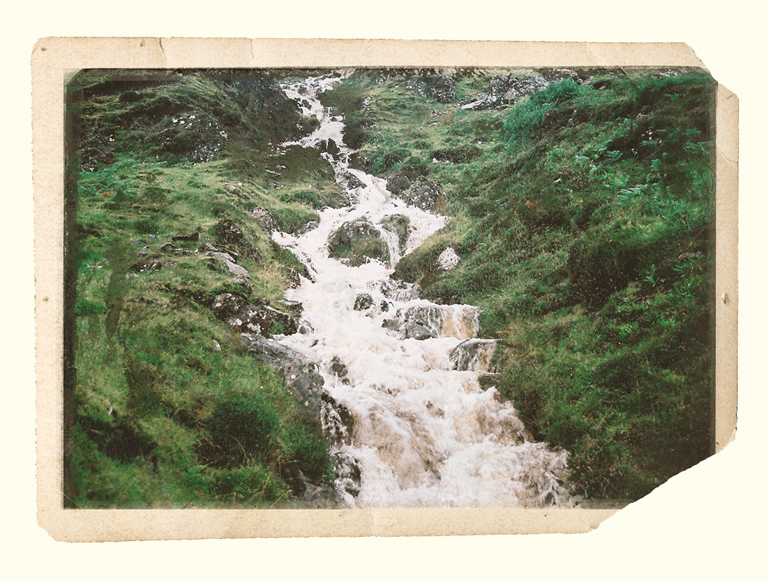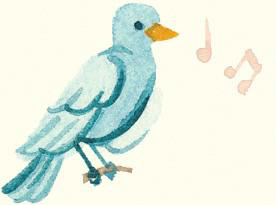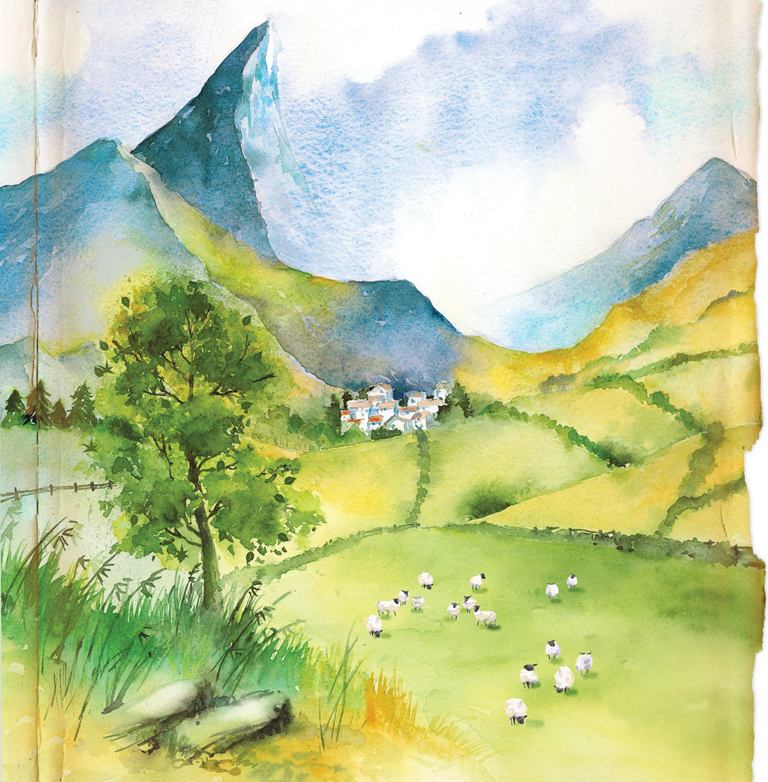
It was early morning of a beautiful day. The valley lay as though still asleep. The only sounds were the joyful laughter of the running streams and the gay little songs of the birds. The dew sparkled on the grass and the wild flowers glowered like little jewels. Especially lovely were the wild anemones, purple, pink and scarlet, which dotted the pastures everywhere, thrusting their beautiful little faces up through the straggling thorns. Sometimes the Shepherd and Much-Afraid walked over patches of thousands of tiny little pink or mauve blossoms, each minutely small and yet all together forming a brilliant carpet, far richer than any seen in a king’s palace.
Once the Shepherd stooped and touched the flowers gently with his fingers, then said to Much-Afraid with a smile, “Humble yourself, and you will find that Love is spreading a carpet of flowers beneath your feet.”
Much-Afraid looked at him earnestly. “I have often wondered about the wild flowers,” she said. “It does seem strange that such unnumbered multitudes should bloom in the wild places of the earth where perhaps nobody ever sees them and the goats and the cattle can walk over them and crush them to death. They have so much beauty and sweetness to give and no one on whom to lavish it, nor who will even appreciate it.”

The look the Shepherd turned on her was very beautiful. “Nothing my Father and I have made is ever wasted,” he said quietly, “and the little wild flowers have a wonderful lesson to teach. They offer themselves so sweetly and confidently and willingly, even if it seems that there is no one to appreciate them. Just as though they sang a joyous little song to themselves, that it is so happy to love, even though one is not loved in return.
“I must tell you a great truth, Much-Afraid, which only the few understand. All the fairest beauties in the human soul, its greatest victories, and its most splendid achievements are always those which no one else knows anything about, or can only dimly guess at. Every inner response of the human heart to Love and every conquest over self-love is a new flower on the tree of Love.
“Many a quiet, ordinary, and hidden life, unknown to the world, is a veritable garden in which Love’s flowers and fruits have come to such perfection that it is a place of delight where the King of Love himself walks and rejoices with his friends. Some of my servants have indeed won great visible victories and are rightly loved and reverenced by other men, but always their greatest victories are like the wild flowers, those which no one knows about. Learn this lesson now, down here in the valley, Much-Afraid, and when you get to the steep places of the mountains it will comfort you.”
Then he added, “Come, the birds are all singing so joyously, let us join them too, and the flowers shall suggest the theme of our song.” So, as they walked down the Valley toward the river, they sang together another of the old songs in the Shepherd’s book, singing the parts in turn.

I am the Rose of Sharon,
A wild anemone.
As lily ’mong the thorn trees
So is my love to me.
An apple tree ’mong wild trees,
My Love is in my sight,
I sit down in his shadow,
His fruit is my delight.
He brought me to his palace,
And to the banquet hall,
To share with me his greatness,
I, who am least of all.
Oh, give me help and comfort,
For I am sick with shame,
Unfit to be his consort,
Unfit to bear his Name.
I charge you, o ye daughters,
Ye roes among the trees,
Stir not my sleeping loved one,
To love me e’er he please.
CANT. 2:1-4, 7
Just as they finished singing this song they came to a place where a rushing stream poured itself across the path they were following and went cascading down the other side. It was running so swiftly and singing so loudly that it seemed to fill the valley around them with its laughing voice.
As the Shepherd lifted Much-Afraid across the slippery, wet stones she said to him, “I do wish I knew what it is that all running water sings.
“Sometimes in the silence of the night I lie in bed and listen to the voice of the little stream which runs past our cottage garden. It sounds so happy and so eager, and as though it were repeating to itself over and over again some very lovely, secret message. I think all running water seems to be singing the same song, either loud and clear or soft and low. I do wish I knew what the waters were saying. It is quite different from the voice of the sea and of salt waters, but I never can understand it. It is an unknown tongue. Tell me, Shepherd, do you know what all the waters sing as they hurry on their way?”

The Shepherd smiled again, and they stood silently for a few moments by the little torrent, which seemed to shout even more loudly and exultantly as though it knew they had paused to listen. Suddenly, as Much-Afraid stood beside the Shepherd it seemed as though her ears and her understanding were open, and bit by bit, the water-language became clear. It is, of course, impossible to write it in water-language, but this is the best I can do to translate it. Of course, it is a very poor effort, for though a water song perhaps may be set to music, words are quite a different matter. But it went something like this:

THE WATER SONG
Come, oh come! let us away —
Lower, lower every day,
Oh, what joy it is to race
Down to find the lowest place.
This the dearest law we know —
“It is happy to go low.”
Sweetest urge and sweetest will,
“Let us go down lower still.”
Hear the summons night and day
Calling us to come away.
From the heights we leap and flow
To the valleys down below.
Always answering to the call,
To the lowest place of all.
Sweetest urge and sweetest pain,
To go low and rise again.
“That is very puzzling,” said Much-Afraid, after she had listened for a little and found that this was the refrain, repeated over and over again, though with a thousand variations of little trills and murmurs and bubbles and splashing sighs.
“‘Let us go down lower still,’ the water seems to be singing so gladly, because it is hurrying to go down to the lowest place, and yet you are calling me to the Highest Places. What does it mean?”
“The High Places,” answered the Shepherd, “are the starting places for the journey down to the lowest place in the world. When you have hinds’ feet and can go ‘leaping on the mountains and skipping on the hills,’ you will be able, as I am, to run down from the heights in gladdest self-giving and then go up to the mountains again. You will be able to mount to the High Places swifter than eagles, for it is only up on the High Places of Love that anyone can receive the power to pour themselves down in an utter abandonment of self-giving.”
This saying seemed very mysterious and strange, but now that her ears had been opened to understand the water song, she heard it repeated over and over again by all the little streams which crossed their pathway or ran beside it. It seemed, too, that the wild flowers were also singing the same sort of song, only in yet another language, a color language, which, like the water tongue, could only be understood by the heart and not by the mind. They seemed to have a little chorus all their own which thousands upon thousands of them were singing in different color notes.

This is the law by which we live —
It is so sweet to give and give.
After that it seemed to Much-Afraid that all the little birds were chirping and trilling and lilting a tiny theme song also, with unnumbered variations, but still with one chorus breaking in all the time.

This is the joy of all winged life above —
Happy it is to be able to love.
“I never knew before,” said Much-Afraid suddenly, “that the Valley is such a beautiful place and so full of song.”
The Shepherd laughed and answered, “Only Love can really understand the music and the beauty and the joy which was planted in the heart of all created things. Have you forgotten that two days ago I planted the seed of Love in your heart? Already it has begun to make you hear and see things which you did not notice before.
“As Love grows in you, Much-Afraid, you will come to understand many things which you never dreamed of before. You will develop the gift of understanding many ‘unknown tongues’ and you will learn to speak Love’s own language too, but first you must learn to spell out the alphabet of Love and to develop hinds’ feet. Both these things you will learn on the journey to the High Places, and now here we are at the river, and over on the other side the foothills of the mountains begin. There we shall find your two guides waiting for you.”
It was strange and wonderful indeed, thought Much-Afraid, that they had reached the river so quickly and were already approaching the mountains. Upheld by the Shepherd’s hand and supported by his strength, she had really forgotten her lameness and had been unconscious of either tiredness or weakness. Oh, if only he would take her the whole way to the mountain places, instead of giving her over to the care of other guides.
When she thought of this, she said to him imploringly, “Will you not take me all the way? When I am with you I am strong and I am sure no one else but you can get me up to the High Places.”
He looked at her most kindly, but answered quietly, “Much-Afraid, I could do what you wish. I could carry you all the way up to the High Places myself, instead of leaving you to climb there. But if I did, you would never be able to develop hinds’ feet, and become my companion and go where I go. If you will climb to the heights this once with the companions I have chosen for you, even though it may seem a very long and in some places a very difficult journey, I promise you that you will develop hinds’ feet.
“Afterwards you will be able to go with me, ‘leaping on the mountains,’ and be able to make the ascent and the descent in the twinkling of an eye. Moreover, if I carry you up to the High Places now, with only a tiny seed of Love in your heart, you will not be able to live in the Kingdom of Love. You will have to stay outside on places not so high, still within reach of your enemies.

“Some of them, you know, can visit the lower parts of the mountain. I have no doubt that you will meet them as you make the ascent. That is why I have most carefully chosen for you two of the very best and strongest guides. I assure you, however, that never for a moment shall I be beyond your reach or call for help, even when you cannot see me. It is just as though I shall be present with you all the time, even though invisible. And you have my faithful promise that this journey which you are now to make will be the means of developing your hinds’ feet.”
“You will give me a new name when I get to the top?” quavered poor Much-Afraid, who all of a sudden seemed to have become deaf to the music around her and to be full of fears and forebodings again.

“Yes, certainly. When the flower of Love is ready to bloom in your heart, you will be loved in return and will receive a new name,” replied the Shepherd.
Much-Afraid paused on the bridge and looked back over the way they had come. The Valley looked very green and peaceful, while the mountains to whose foot they had come towered above them like gigantic and threatening ramparts. Far away in the distance she could see the trees growing around the village of Much-Trembling, and with a sudden pang she pictured the Shepherd’s helpers going about their happy work, the flocks wandering over the pastures and the peaceful little white cottage in which she had lived.
As these scenes rose before her, tears began to prick in her eyes and the thorn pricked in her heart, but almost at once she turned to the Shepherd and said thankfully, “I will trust you and do whatever you want.”
Then, as she looked up in his face, he smiled most sweetly and said something he had never said before, “You have one real beauty, Much-Afraid, you have such trustful eyes. Trust is one of the most beautiful things in the world. When I look at the trust in your eyes I find you more beautiful to look upon than many a lovely queen.”
In a very short time they were over the bridge, and had come to the foot of the mountains, where the path began the ascent of the lower slopes. Here great boulders were scattered all around, and suddenly Much-Afraid saw the figures of two veiled women seated on one of the rocks at the side of the path. As the Shepherd and she came up to that place, the two rose and bowed silently to him.
“Here are the two guides which I promised,” said the Shepherd quietly. “From now on until you are over the steep and difficult places, they will be your companions and helpers.”
Much-Afraid looked at them fearfully. Certainly they were tall and appeared to be very strong, but why were they veiled? For what reason did they hide their faces? The longer and closer she looked at them, the more she began to dread them. They were so silent, so strong, and so mysterious. Why did they not speak? Why give her no friendly word of greeting?
“Who are they?” she whispered to the Shepherd. “Will you tell me their names, and why don’t they speak to me? Are they dumb?”
“No, they are not dumb,” said the Shepherd very quietly, “but they speak a new language, Much-Afraid, a dialect of the mountains which you have not yet learned. But as you travel with them, little by little, you will learn to understand their words.
“They are good teachers; indeed, I have few better. As for their names, I will tell you them in your own language, and later you will learn what they are called in their own tongue. This,” said he, motioning toward the first of the silent figures, “is Sorrow. And the other is her twin sister, Suffering.”
Poor Much-Afraid! Her cheeks blanched and she began to tremble from head to foot. She felt so like fainting that she clung to the Shepherd for support.
“I can’t go with them,” she gasped. “I can’t! I can’t! O my Lord Shepherd, why do you do this to me? How can I travel in their company? It is more than I can bear. You tell me that the mountain way itself is so steep and difficult that I cannot climb it alone. Then why, oh why, must you make Sorrow and Suffering my companions? Couldn’t you have given Joy and Peace to go with me, to strengthen me and encourage me and help me on the difficult way? I never thought you would do this to me!” And she burst into tears.
A strange look passed over the Shepherd’s face as he listened to this outburst, then looking at the veiled figures as he spoke, he answered very gently, “Joy and Peace. Are those the companions you would choose for yourself? You remember your promise, to accept the helpers that I would give, because you believed that I would choose the very best possible guides for you. Will you still trust me, Much-Afraid? Will you go with them, or do you wish to turn back to the Valley, and to all your Fearing relatives, to Craven Fear himself?”
Much-Afraid shuddered. The choice seemed terrible. Fear she knew only too well, but Sorrow and Suffering had always seemed to her the two most terrifying things which she could encounter. How could she go with them and abandon herself to their power and control? It was impossible. Then she looked at the Shepherd and suddenly knew she could not doubt him, could not possibly turn back from following him; that if she were unfit and unable to love anyone else in the world, yet in her trembling, miserable little heart, she did love him. Even if he asked the impossible, she could not refuse.
She looked at him piteously, then said, “Do I wish to turn back? O Shepherd, to whom should I go? In all the world I have no one but you. Help me to follow you, even though it seems impossible. Help me to trust you as much as I long to love you.”
As he heard these words the Shepherd suddenly lifted his head and laughed —a laugh full of exultation and triumph and delight. It echoed round the rocky walls of the little canyon in which they stood until for a moment or two it seemed as though the whole mountain range was laughing with him. The echoes bounded higher and higher, leaping from rock to rock, and from crag to crag, up to the highest summits, until it seemed as though the last faint echoes of it were running into heaven itself.
When the last note had faded into silence, his voice said very softly, “Thou art all fair, my love; there is no spot in thee” (Cant. 4:7). Then he added, “Fear not, Much-Afraid, only believe. I promise that you shall not be put to shame. Go with Sorrow and Suffering, and if you cannot welcome them now, when you come to the difficult places where you cannot manage alone, put your hands in theirs confidently and they will take you exactly where I want you to go.”
Much-Afraid stood quite still, looking up into his face, which now had such a happy, exultant look, the look of one who above all things else delights in saving and delivering. In her heart the words of a hymn, written by another of the Shepherd’s followers, began to run through her mind and she started to sing softly and sweetly:

Let Sorrow do its work, send grief or pain;
Sweet are thy messengers, sweet their refrain.
If they but work in me, more love, O Christ, to thee,
More love to thee, more love to thee.
“Others have gone this way before me,” she thought, “and they could even sing about it afterwards. Will he who is so strong and gentle be less faithful and gracious to me, weak and cowardly though I am, when it is so obvious that the thing he delights in most of all is to deliver his followers from all their fears and to take them to the High Places?” With this came the thought that the sooner she went with these new guides, the sooner she would reach those glorious High Places.
She stepped forward, looking at the two veiled figures, and said with a courage which she had never felt before, “I will go with you. Please lead the way,” for even then she could not bring herself to put out her hands to grasp theirs.
The Shepherd laughed again and then said clearly, “My Peace I leave with you. My Joy be fulfilled in you. Remember that I pledge myself to bring you to the High Places at the top of these mountains and that you shall not be put to shame and now ‘till the day break and the shadows flee away, I will be like a roe or a young hart on the mountains’” (Cant. 2:17).
Then before Much-Afraid could realize what was happening, he had leaped on to a great rock at the side of the path and from there to another and to yet another, swifter almost than her eyes could follow his movements. He was leaping up the mountains, springing from height to height, going on before them until in a moment or two he was lost to sight.
When they could see him no longer, Much-Afraid and her two new companions began to ascend the foothills. It would have been a curious sight, had there been anyone to watch, as Much-Afraid started on her journey, limping toward the High Places, shrinking as far as possible from the two veiled figures beside her, pretending not to see their proffered hands. But there was no one there to see, for if there is one thing more certain than another, it is that the development of hinds’ feet is a secret process, demanding that there should be no onlookers.